[SPA-ENG] Crías de tero | Tero hatchlings
Si me preguntan cuál es el ruido más estridente del lugar donde vivo, probablemente responda que son los chillidos de los teros cuando, por alguna razón, se sienten amenazados. Como la vida en la naturaleza está llena de peligros para un pájaro, es usual que los teros den gritos a cada rato. Basta con acercarse un poco a ellos para que lancen sus chillidos y, en casos extremos, para que hagan un vuelo rasante sobre la cabeza del intruso.
He leído que hay gente que tiene a los teros como mascotas. Les cortan las alas y los dejan allí, como si fueran perros guardianes. Ay, esa costumbre de algunas personas de apropiarse de las cosas… En este tiempo, aprendí que no es necesario cortarles las alas para que los teros se queden. Solo hay que tratarlos con respeto, no molestarlos, saludarlos por las mañanas con un gesto amable y unas palabras alentadoras (bueno, quizás esto último no sea necesario después de todo…). En fin, crear las condiciones para que los teros (y cualquier otro pájaro) puedan vivir su vida de pájaro sin más contratiempos que los naturales (que no son pocos).
If you ask me what is the loudest noise where I live, I would probably answer that it is the screeching of the teros when, for some reason, they feel threatened. Since life in the wild is full of dangers for a bird, it is usual for teros to scream all the time. It is enough to get a little closer to them for the teros to let out their screeches and, in extreme cases, for them to make a low flight over the intruder's head.
I have read that some people keep teros as pets. They clip their wings and leave them there, as if they were guard dogs. Oh, that habit of some people of appropriating things... During this time, I learned that it is not necessary to clip their wings for teros to stay. Just treat them with respect, don't bother them, greet them in the morning with a kind gesture and a few encouraging words (well, maybe the latter is not necessary after all...). In short, create the conditions so that the teros (and any other bird) can live their bird life without any more setbacks than the natural ones (which are not few).
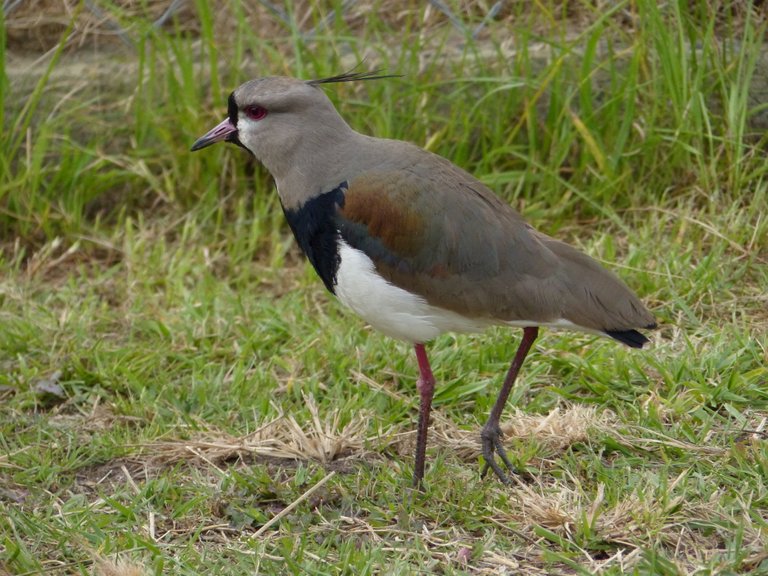
Los teros no son de esos pájaros que disfrutan de los árboles. Vuelan, claro que sí, y son hermosos en su vuelo (a excepción de los vuelos rasantes sobre mi cabeza), pero son más bien de andar caminando por el pasto y de hacer sus nidos a ras del suelo o en pozos apenas profundos. No es nada fácil encontrar un nido de tero: tienen sus tácticas para esconderlos, los muy arteros. Ya lo dijo José Hernández:
The teros are not one of those birds that enjoy the trees. They fly, of course, and are beautiful in flight (except for the low flights over my head), but they are more about walking in the grass and making their nests low to the ground or in shallow holes. It is not at all easy to find a tero's nest: they have their own tactics to hide them, the very sneaky ones. As José Hernández said:
De los males que sufrimos
hablan mucho los puebleros,
pero hacen como los teros
para esconder sus niditos:
en un lao pegan los gritos
y en otros tienen los güevos.
Of the wrongs we endure,
the villagers talk a lot,
but they do as the teros do
to hide their little nests:
on one place they scream
and on the other they have their eggs.
No sé dónde habrán hecho el nido los teros que viven en mi casa, que para ellos es tan suya como mía (de nuevo, esa costumbre de las personas de apropiarse de las cosas…), pero en algún lugar lo habrán hecho, porque hace unos días se aparecieron con tres teritos recién nacidos.
I don't know where the teros that live in my house, which for them is as much theirs as mine (again, that habit of people to appropriate things...), must have made their nest, but they must have done it somewhere, because a few days ago they showed up with three newborn teros.
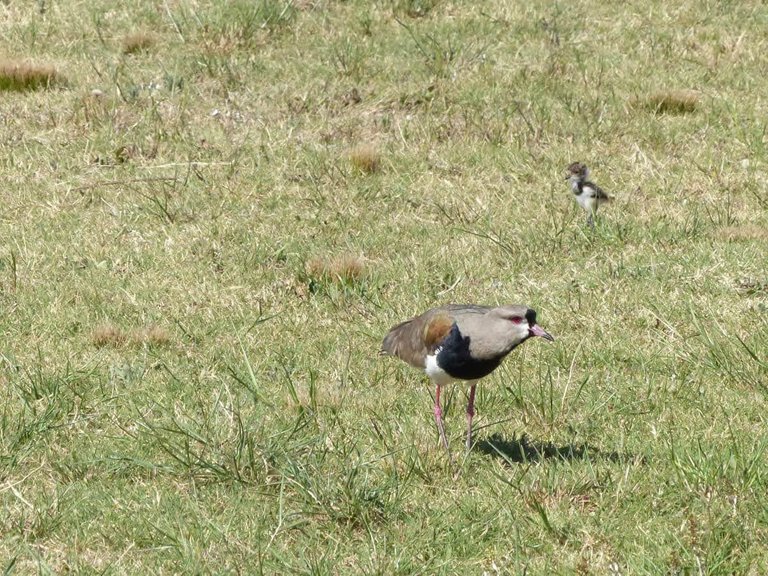
Como era de esperar, los flamantes mamá y papá tero estaban más nerviosos que de costumbre, lo que es mucho decir para unos pájaros cascarrabias por naturaleza. No dejaron que me acercara para sacar fotos, ni para felicitarlos por el acontecimiento, así que tuve que hacer uso de todo el zoom que tengo, que, a decir verdad, no es mucho.
As expected, the brand new mama and papa tero were more nervous than usual, which is saying a lot for such naturally cantankerous birds. They wouldn't let me get close enough to take pictures or congratulate them on the event, so I had to use all the zoom I have, which, truth be told, isn't much.
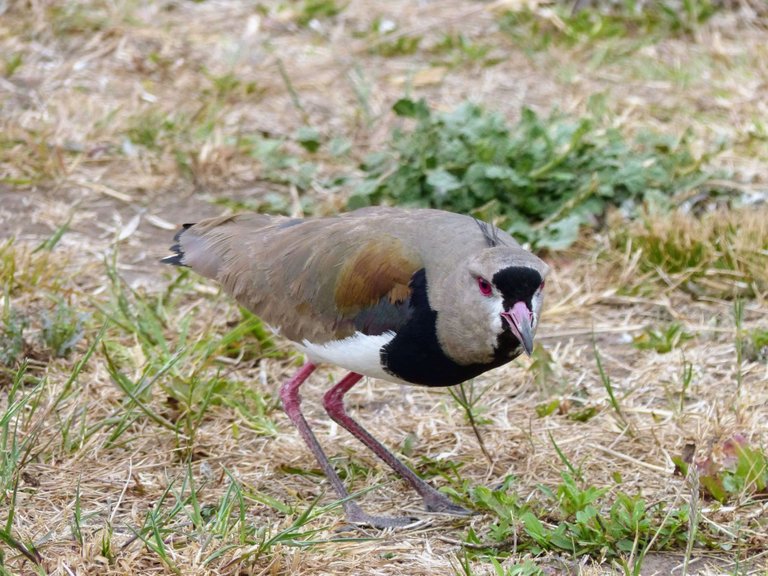
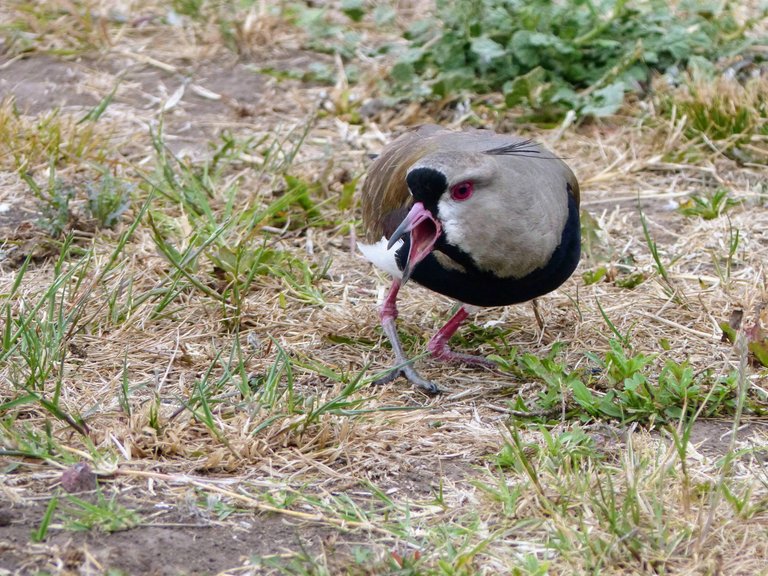
La vida de los pichones no es nada fácil, hay demasiados animales que quieren comerlos. Los teros adultos son muy protectores de sus crías. No sé cuál es el macho y cuál la hembra, pero mientras uno pasa el día chillándole a todo lo que le parezca amenazador, el otro oculta a los pichones bajo su ala. A la larga, sin embargo, cuidar tres pichones se torna casi imposible. Los pequeños teros, llenos de juventud y de deseos de conocer ese mundo repleto de lombrices y escarabajos, van de aquí para allá, caminando (porque todavía no saben volar), sin reconocer los peligros que acechan.
The life of the chicks is not easy, there are too many animals that want to eat them. Adult teros are very protective of their young. I don't know which is the male and which is the female, but while one spends the day screeching at anything that looks threatening, the other hides the chicks under his wing. In the long run, however, caring for three chicks becomes almost impossible. The little teros, full of youth and desire to know this world full of worms and beetles, go from here to there, walking (because they do not yet know how to fly), without recognizing the dangers that lurk.
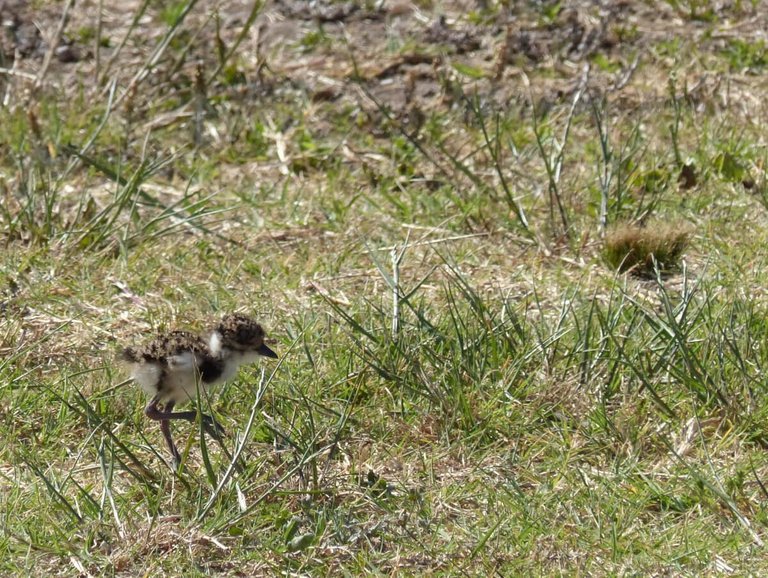

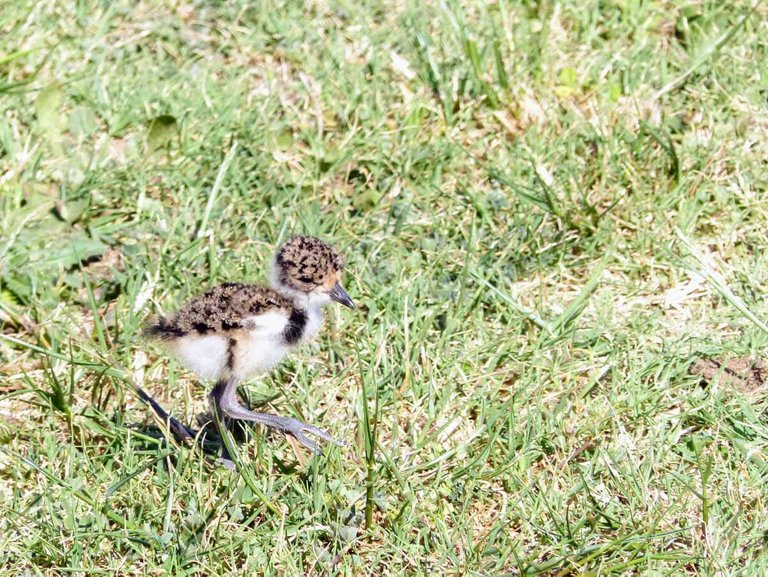

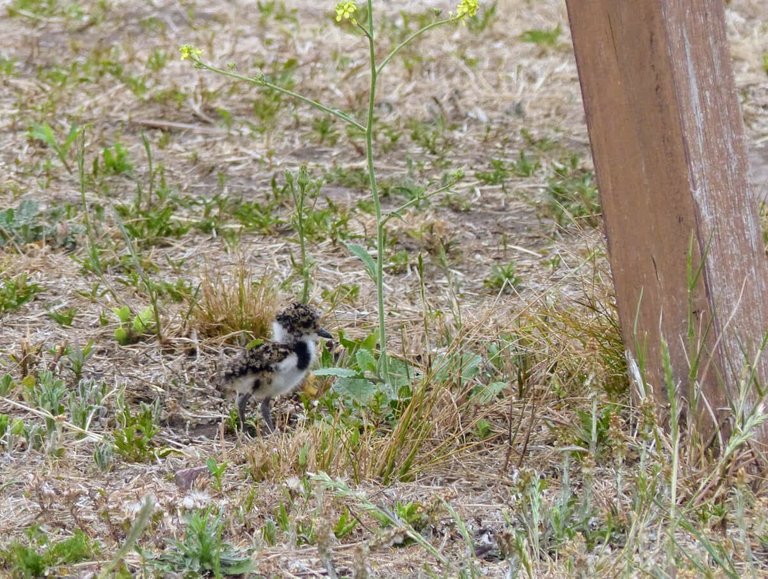
Con el paso de los días, quedaron dos teritos, y luego uno solo. No sé si sobrevivirá o no. Yo apuesto que sí. Después de verlos defender a sus pichones con tanto ímpetu, creo que sería justo invertir el genial limerick de María Elena Walsh y decir: “Basta, ya sé: no es Tero sino Toro”.
As the days went by, there were two teritos left, and then only one. I don't know if it will survive or not. My bet is that it will. After seeing them defend their chicks with such impetus, I think it would be fair to reverse María Elena Walsh's great limerick and say: "Enough, I know: it's not Tero but Toro". ["Toro" is the Spanish word for “bull”.]

Traducido al inglés con Deepl.
Todas las fotos fueron sacadas por mí.
Translated into English with Deepl.
All photos were taken by me.
Great photo's! Espescially of the small chick. Thanks for sharing them.
Thank you! It wasn't easy to get them out, the young teros moved around a lot and the adults were nervous and I didn't want to disturb them, so I ended up taking them out through the window.
Thank you very much for your support!
Wonderful ! 😊
Thank you! The birds are really wonderful!
Hermoso, gracias por compartir tus fotos! Me encanta las aves libres disfrutando de la naturaleza y si ellos eligen estar cerca de nosotros pues son bien recibidos!
Sí, solo hay que tener paciencia, plantas nativas y ellos solos van llegando y quedándose. ¡Saludos y muchas gracias por el comentario!
Hola querido amigo @agreste buen día
Que hermoso post, me encanta ver a las aves vivir sus días libremente.
Es bueno ver el crecimiento de la familia tero
Que pases un hermoso dia
¡Muchas gracias por el comentario, @jlufer! Es cierto, me siento muy afortunado de poder asomarme a la ventana de mi casa y ver una familia de teros creciendo. ¡Abrazo!